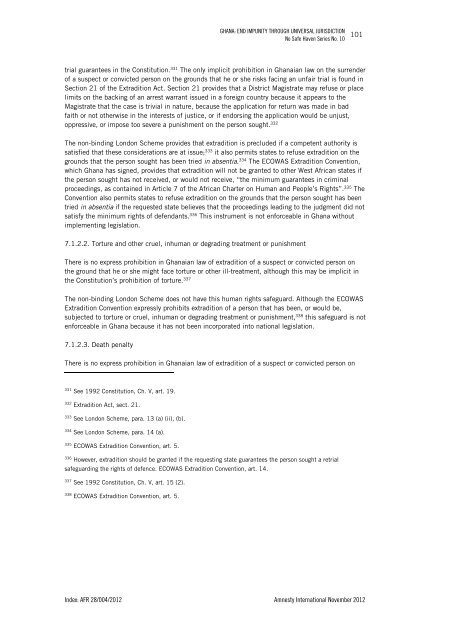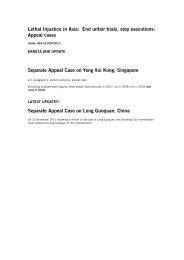Ghana - Amnesty International
Ghana - Amnesty International
Ghana - Amnesty International
You also want an ePaper? Increase the reach of your titles
YUMPU automatically turns print PDFs into web optimized ePapers that Google loves.
GHANA: END IMPUNITY THROUGH UNIVERSAL JURISDICTIONNo Safe Haven Series No. 10101trial guarantees in the Constitution. 331 The only implicit prohibition in <strong>Ghana</strong>ian law on the surrenderof a suspect or convicted person on the grounds that he or she risks facing an unfair trial is found inSection 21 of the Extradition Act. Section 21 provides that a District Magistrate may refuse or placelimits on the backing of an arrest warrant issued in a foreign country because it appears to theMagistrate that the case is trivial in nature, because the application for return was made in badfaith or not otherwise in the interests of justice, or if endorsing the application would be unjust,oppressive, or impose too severe a punishment on the person sought. 332The non-binding London Scheme provides that extradition is precluded if a competent authority issatisfied that these considerations are at issue; 333 it also permits states to refuse extradition on thegrounds that the person sought has been tried in absentia. 334 The ECOWAS Extradition Convention,which <strong>Ghana</strong> has signed, provides that extradition will not be granted to other West African states ifthe person sought has not received, or would not receive, “the minimum guarantees in criminalproceedings, as contained in Article 7 of the African Charter on Human and People’s Rights”. 335 TheConvention also permits states to refuse extradition on the grounds that the person sought has beentried in absentia if the requested state believes that the proceedings leading to the judgment did notsatisfy the minimum rights of defendants. 336 This instrument is not enforceable in <strong>Ghana</strong> withoutimplementing legislation.7.1.2.2. Torture and other cruel, inhuman or degrading treatment or punishmentThere is no express prohibition in <strong>Ghana</strong>ian law of extradition of a suspect or convicted person onthe ground that he or she might face torture or other ill-treatment, although this may be implicit inthe Constitution’s prohibition of torture. 337The non-binding London Scheme does not have this human rights safeguard. Although the ECOWASExtradition Convention expressly prohibits extradition of a person that has been, or would be,subjected to torture or cruel, inhuman or degrading treatment or punishment, 338 this safeguard is notenforceable in <strong>Ghana</strong> because it has not been incorporated into national legislation.7.1.2.3. Death penaltyThere is no express prohibition in <strong>Ghana</strong>ian law of extradition of a suspect or convicted person on331See 1992 Constitution, Ch. V, art. 19.332Extradition Act, sect. 21.333See London Scheme, para. 13 (a) (ii), (b).334See London Scheme, para. 14 (a).335ECOWAS Extradition Convention, art. 5.336However, extradition should be granted if the requesting state guarantees the person sought a retrialsafeguarding the rights of defence. ECOWAS Extradition Convention, art. 14.337See 1992 Constitution, Ch. V, art. 15 (2).338ECOWAS Extradition Convention, art. 5.Index: AFR 28/004/2012 <strong>Amnesty</strong> <strong>International</strong> November 2012
















